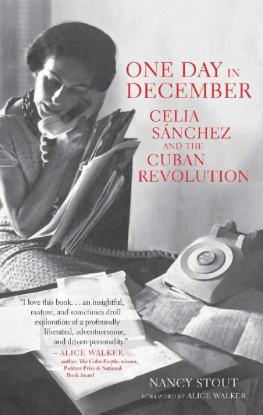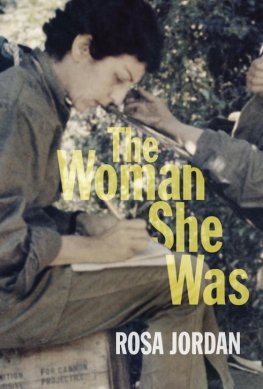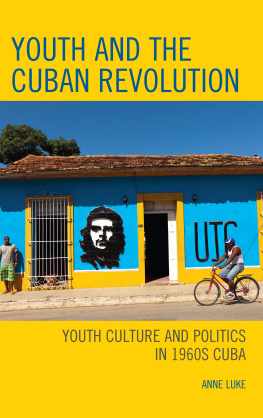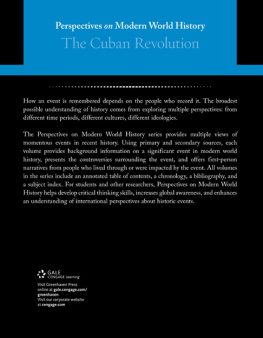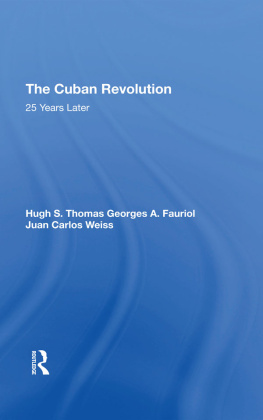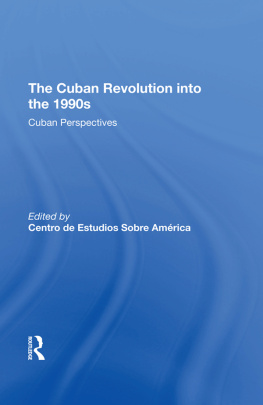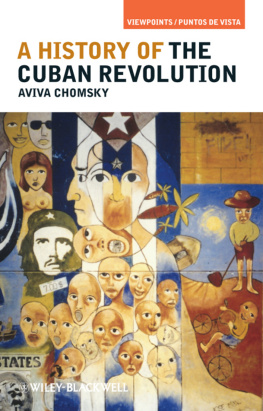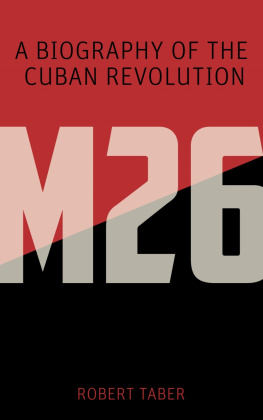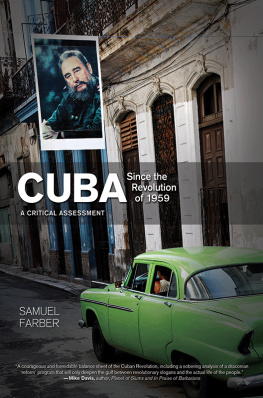Nancy Stout - One Day in December: Celia Sánchez and the Cuban Revolution
Here you can read online Nancy Stout - One Day in December: Celia Sánchez and the Cuban Revolution full text of the book (entire story) in english for free. Download pdf and epub, get meaning, cover and reviews about this ebook. year: 2013, publisher: Monthly Review, genre: Non-fiction / History. Description of the work, (preface) as well as reviews are available. Best literature library LitArk.com created for fans of good reading and offers a wide selection of genres:
Romance novel
Science fiction
Adventure
Detective
Science
History
Home and family
Prose
Art
Politics
Computer
Non-fiction
Religion
Business
Children
Humor
Choose a favorite category and find really read worthwhile books. Enjoy immersion in the world of imagination, feel the emotions of the characters or learn something new for yourself, make an fascinating discovery.
- Book:One Day in December: Celia Sánchez and the Cuban Revolution
- Author:
- Publisher:Monthly Review
- Genre:
- Year:2013
- Rating:3 / 5
- Favourites:Add to favourites
- Your mark:
- 60
- 1
- 2
- 3
- 4
- 5
One Day in December: Celia Sánchez and the Cuban Revolution: summary, description and annotation
We offer to read an annotation, description, summary or preface (depends on what the author of the book "One Day in December: Celia Sánchez and the Cuban Revolution" wrote himself). If you haven't found the necessary information about the book — write in the comments, we will try to find it.
Nancy Stout: author's other books
Who wrote One Day in December: Celia Sánchez and the Cuban Revolution? Find out the surname, the name of the author of the book and a list of all author's works by series.
One Day in December: Celia Sánchez and the Cuban Revolution — read online for free the complete book (whole text) full work
Below is the text of the book, divided by pages. System saving the place of the last page read, allows you to conveniently read the book "One Day in December: Celia Sánchez and the Cuban Revolution" online for free, without having to search again every time where you left off. Put a bookmark, and you can go to the page where you finished reading at any time.
Font size:
Interval:
Bookmark:
One Day in December
Celia Snchez and the Cuban Revolution
NANCY STOUT

Copyright 2013 by Nancy Stout
All Rights Reserved
Foreword 2013 by Alice Walker
All Rights Reserved
Library of Congress Cataloging-in-Publication Data
Stout, Nancy.
One day in December : Celia Sanchez and the Cuban Revolution / Nancy Stout; foreword by Alice Walker.
pages cm
Includes bibliographical references and index.
ISBN 978-1-58367-317-1 (cloth : alk. paper) 1. Sanchez Manduley, Celia, 19201980. 2. Women revolutionariesCubaBiography. 3. RevolutionariesCubaBiography. 4. CubaHistoryRevolution, 1959Biography. 5. Castro, Fidel, 1926Friends and associates. I.
Title.
F1788.22.S26S76 2013
972.91064092dc23
[B]
2012045594
Monthly Review Press
146 West 29th Street, Suite 6W
New York, New York 10001
www.monthlyreview.org
5 4 3 2 1
by Alice Walker
NOTHING MAKES ME MORE HOPEFUL than discovering another human being to admire. My wonder at the life of Celia Snchez, a revolutionary Cuban woman virtually unknown to Americans, has left me almost speechless. In hindsight, loving and admiring her was bound to happen, once I knew her story. Like Frida Kahlo, Zora Neale Hurston, Rosa Luxemburg, Agnes Smedley, Fannie Lou Hamer, Josephine Baker, Harriet Tubman, or Aung San Suu Kyi, Celia Snchez was that extraordinary expression of life that can, every so often, give humanity a very good name.
A third of a century ago I saw a photograph of Celia taken twenty years before, just after she and her fellow revolutionaries became the official Cuban government. She was in the uniform of the Cuban rebel army, thin as a rail, her dark hair cut very short. Her face was gray and drawn, and she was (I believe) smoking a cigarette. Knowing her life story now more fully, I realize that lung cancer would contribute to her early death, which came close to the time I saw that picture.
I SAT DOWN TO READOne Day in December with little notion that it would affect me so deeply. I read it through, then immediately turned to the first page and read the entire more than four-hundred-page manuscript again. I had the sensation I experienced the first time I saw a Frida Kahlo painting, probably the self-portrait of Frida wearing the necklace of thorns with a dead hummingbird attached: I knew life for women, and for a certain kind of creative rebel, whether female or male, a suffering, creative, and utterly devoted-to-life rebel, would never be the same. This book about Celia Snchez produces a sensation like that. Filled with amazing revelations and documentations of a revolutionary woman whose life seems to me exactly the medicina our desperately flailing societies and countries are crying for. A clear vision of what balanced female leadership can be; and, even more to the point, what a truly egalitarian revolutionary leadership of female and male partners might look like.
Yes, the male were talking about here is el Jefe, Fidel Castro. Revealed in this book to be brave and conscientious, also at times almost comically nave, but unfaltering in his devotion and service to the people of Cuba. The most telling aspect of this was his adoption, along with Celia, of numerous Cuban children, many of whom had lost their parents during the Revolution. Not only did the two adopt these children but, during long years of assassination attempts and other social and political dramas of the most hair-raising sort, they managed to raise them.
Amazingly, Fidel and Celia worked together long before they ever met (sending each other covert messages detailing the work to be done); when they did meet they remained for the most part inseparable until the day of her death. But were they lovers? This is the question that, while Celia lived, obsessed Cubans and non-Cubans alike. Reading this book one sees something so fascinating, so precious, so good for us, that the question loses all meaning. We, in most of our relationships with one another, are headed somewhere else (other, for instance, than conventional marriagevery good news in my opinion) and these two offer a model of a revolutionary partnership that thrived. What they did in moments of privacy is, as this biography sees things, chiefly their own affair. But the question, in subtler forms, is considered. Whether, or to what extent, they were lovers, they were beloveds. Soul mates, compaeros, buddies, who reveled in each other and, together, devoted their lives to the cause of freeing the Cuban people from a brutal dictatorship and its legacy; while envisioning and working toward the creation of The New Person (sometimes referred to as The New Man) and The New Society.
For much of the world Cuba already represents the future, if in fact theres one to be had. It has taught the world, especially the poor and First Worlddominated countries, what it means to bear, over decades, the brunt of implacable, unrelenting and lethal hatred. Coming unfortunately, in Cubas case, from its nearest neighbor, the United States. And shown how, even so, to move steadily forward guided by ones own understanding of ones needs.
The people in this book who were tortured, assassinated, disappeared, left me yearning for and missing them. For instance, Frank Pasa young schoolteacher of twenty who was the other comandante, Fidels partner in guiding the overthrow of the dictator, and Celias primary contact in the early days of the Revolutionwas murdered by Batistas police a month after his younger brother, Josu, had been killed by them. Their mother, Rosrio, who claimed their bodies, is now gone too, yet I am still able, as I experience their story, to feel some of her agony. And that of two indomitable rebel women, Clodomira and Lydia, tortured sadistically before they died in the custody of the police. Much of the world continues to grieve the loss to humanity of Ch Guevara, assassinated so young and with so much still to offer, but he is far from the only astonishing person who is missing, and played a role in Celias Revolution and her story.
Cuba has suffered so much I sometimes think of it as the country whose greatest wealth is the peoples collective experience of deeply shared emotion. All those who struggled so bravely and died, sometimes horribly, were passionately loved and appreciated by the revolutionaries they left behind, and strengthened. I believe it is the glue of this mutually lived history, and the hope of creating a free and healthy Cuba that, even today, holds the country together. In this book we see some of the cost of seeking to live ones own way, charting and being drawn by ones own destiny. These fallen heroes, women and men, young and old, many of them revealed for the first time in this book, are cause to mourn.
But just as much, and also as revealed in this book, cause to celebrate, or simply to admire.
Reading this story we see precisely why Fidel Castro adored Celia Snchez and why Ch and Celia were good friends. All three of these revolutionaries were persons of the highest moral character and integrity; deeply human also in their transgressions and imperfections, they were equals of the fiercest sort. There was also a price on all their heads.
We see something else as well: That the women of Cuba were full participants in the Revolution, combatants, covert operatives, and even co-instigators. It was in fact Celia and Hayde Santamara who, early on and with other women, took up arms to fight the dictatorship. Celia, the daughter of a doctor, who frequently helped her father in his attendance on the poor, a society girl and high-school beauty queen, this woman who wore red lipstick, wide skirts, high heels (and would wear high heels with her rebel army uniform when she felt like it) took to the mountains of eastern Cuba with Fidel, Ch and other revolutionaries no less brave but far less known, and placed her life against the killing machine of wealth, corruption, and depravity that so insulted and wounded her beloved country.
Next pageFont size:
Interval:
Bookmark:
Similar books «One Day in December: Celia Sánchez and the Cuban Revolution»
Look at similar books to One Day in December: Celia Sánchez and the Cuban Revolution. We have selected literature similar in name and meaning in the hope of providing readers with more options to find new, interesting, not yet read works.
Discussion, reviews of the book One Day in December: Celia Sánchez and the Cuban Revolution and just readers' own opinions. Leave your comments, write what you think about the work, its meaning or the main characters. Specify what exactly you liked and what you didn't like, and why you think so.

